通用版 小学英语小升初 语法句型转换-一般将来时 课件(共27张PPT)
文档属性
| 名称 | 通用版 小学英语小升初 语法句型转换-一般将来时 课件(共27张PPT) | 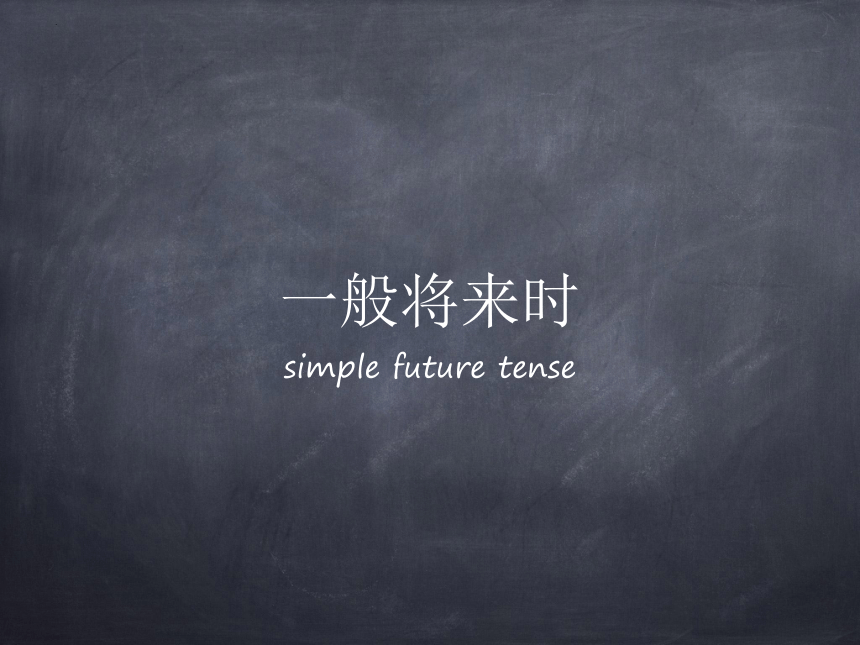 | |
| 格式 | pptx | ||
| 文件大小 | 826.8KB | ||
| 资源类型 | 试卷 | ||
| 版本资源 | 通用版 | ||
| 科目 | 英语 | ||
| 更新时间 | 2023-08-12 08:36:48 | ||
图片预览

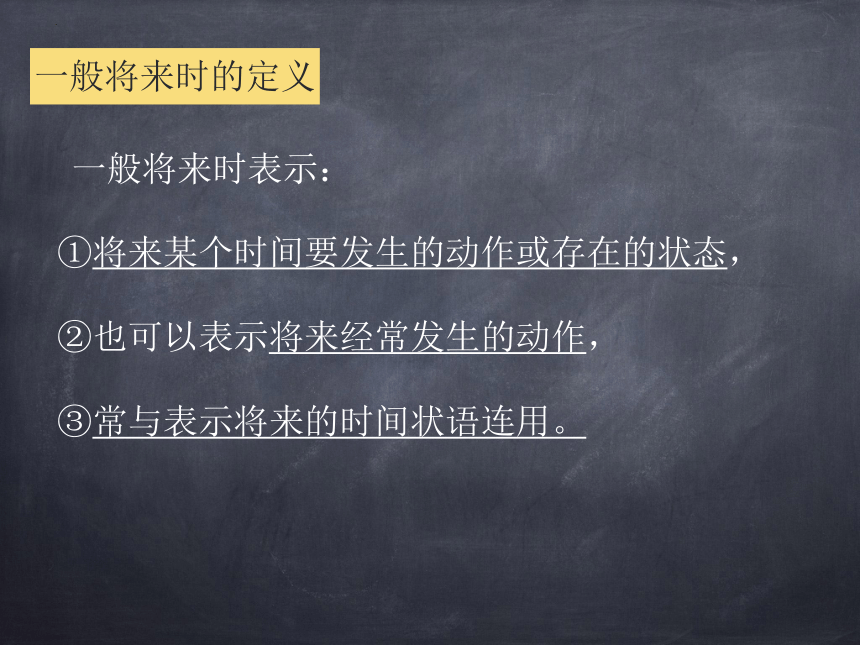
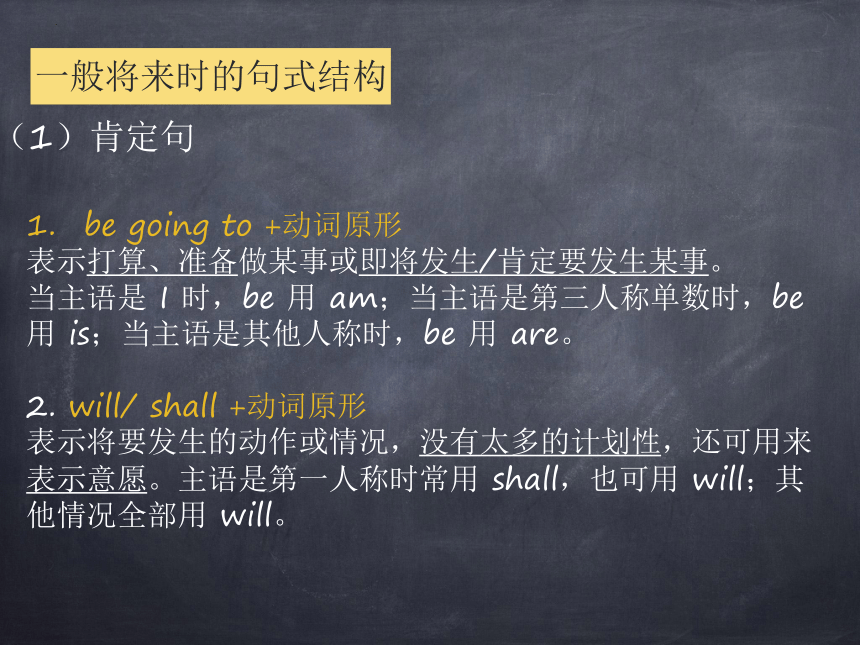
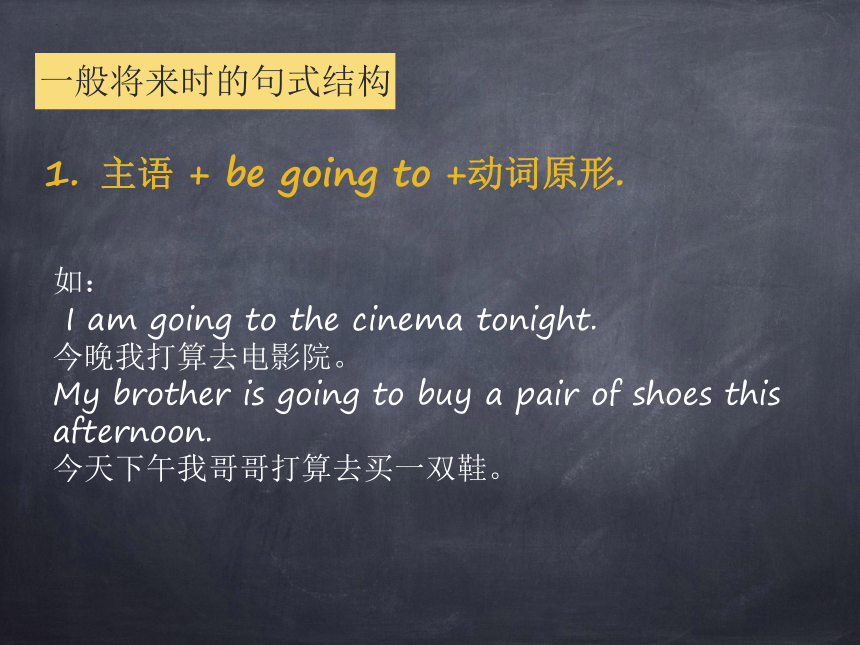
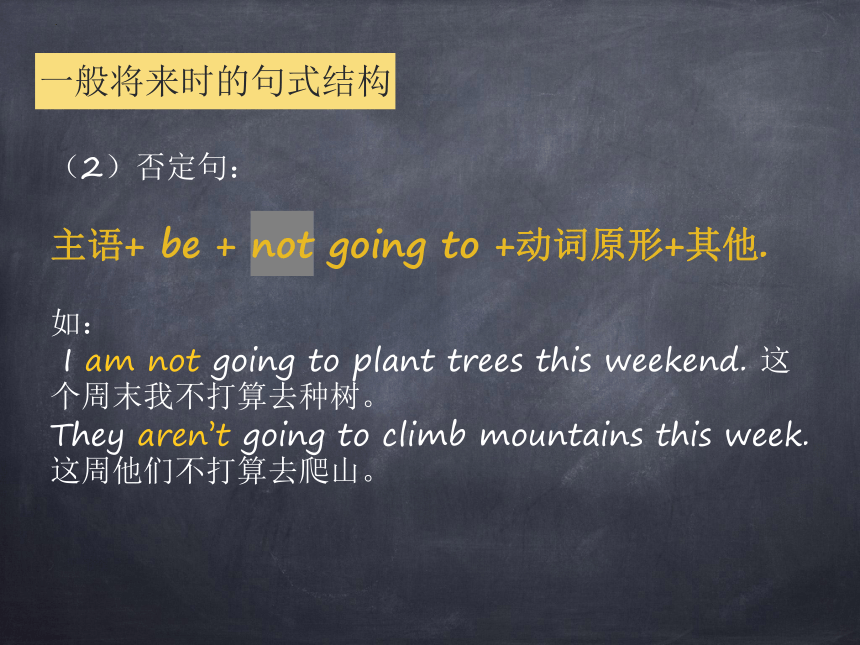
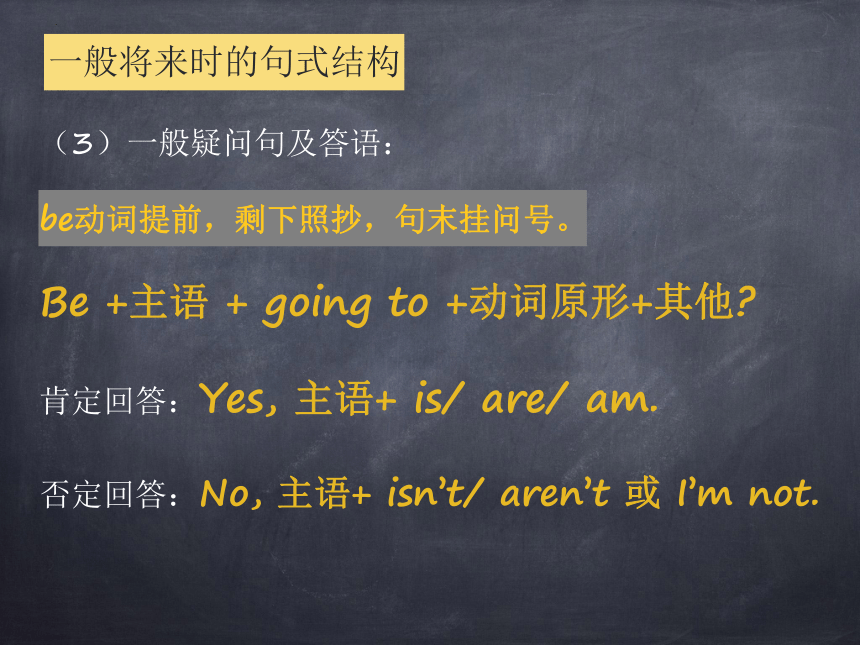
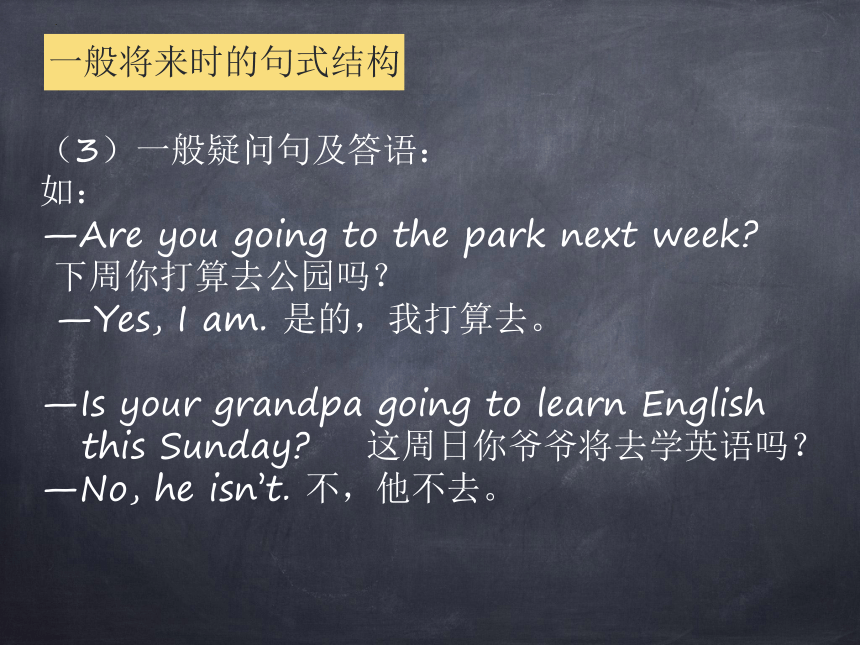
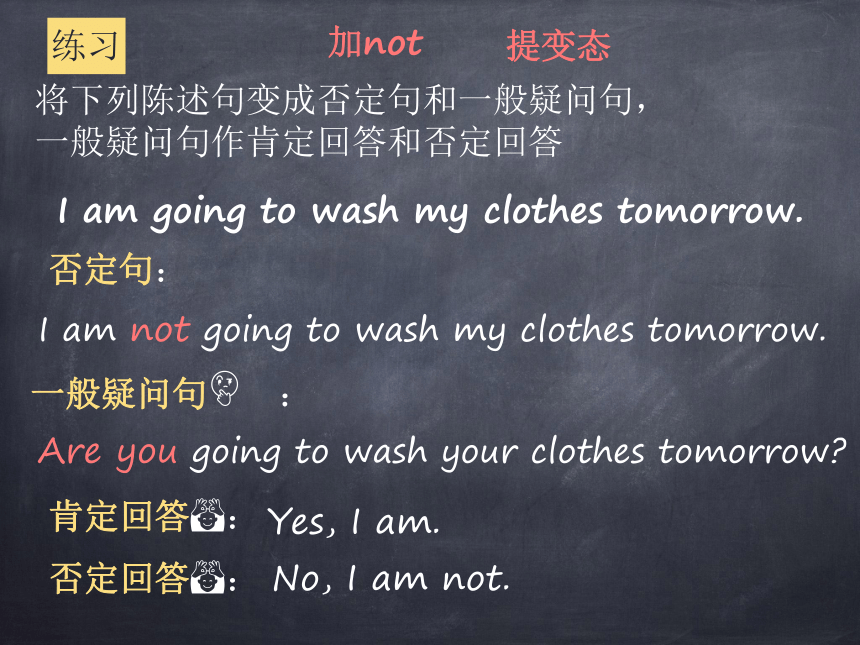
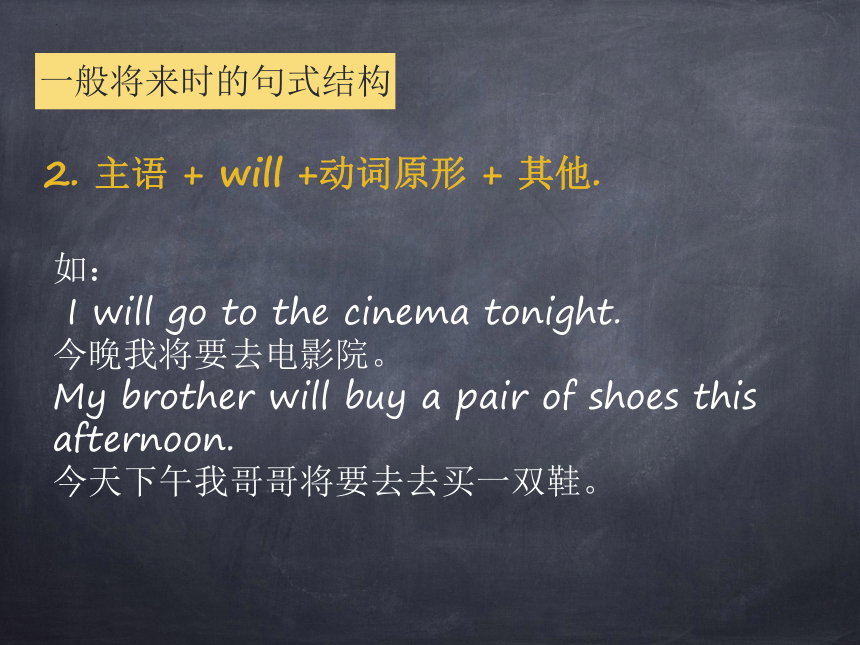
文档简介
(共27张PPT)
一般将来时
simple future tense
一般将来时表示:
①将来某个时间要发生的动作或存在的状态,
②也可以表示将来经常发生的动作,
③常与表示将来的时间状语连用。
一般将来时的定义
be going to +动词原形
表示打算、准备做某事或即将发生/肯定要发生某事。
当主语是 I 时,be 用 am;当主语是第三人称单数时,be 用 is;当主语是其他人称时,be 用 are。
2. will/ shall +动词原形
表示将要发生的动作或情况,没有太多的计划性,还可用来表示意愿。主语是第一人称时常用 shall,也可用 will;其他情况全部用 will。
一般将来时的句式结构
(1)肯定句
一般将来时的句式结构
如:
I am going to the cinema tonight.
今晚我打算去电影院。
My brother is going to buy a pair of shoes this afternoon.
今天下午我哥哥打算去买一双鞋。
主语 + be going to +动词原形.
一般将来时的句式结构
(2)否定句:
主语+ be + not going to +动词原形+其他.
如:
I am not going to plant trees this weekend. 这个周末我不打算去种树。
They aren’t going to climb mountains this week.
这周他们不打算去爬山。
(3)一般疑问句及答语:
be动词提前,剩下照抄,句末挂问号。
Be +主语 + going to +动词原形+其他
肯定回答:Yes, 主语+ is/ are/ am.
否定回答:No, 主语+ isn’t/ aren’t 或 I’m not.
一般将来时的句式结构
(3)一般疑问句及答语:
如:
—Are you going to the park next week
下周你打算去公园吗?
—Yes, I am. 是的,我打算去。
—Is your grandpa going to learn English
this Sunday 这周日你爷爷将去学英语吗?
—No, he isn’t. 不,他不去。
一般将来时的句式结构
将下列陈述句变成否定句和一般疑问句,一般疑问句作肯定回答和否定回答
I am going to wash my clothes tomorrow.
否定句:
一般疑问句 :
肯定回答 :
否定回答 :
加not
提变态
I am not going to wash my clothes tomorrow.
Are you going to wash your clothes tomorrow
Yes, I am.
No, I am not.
练习
一般将来时的句式结构
如:
I will go to the cinema tonight.
今晚我将要去电影院。
My brother will buy a pair of shoes this afternoon.
今天下午我哥哥将要去去买一双鞋。
2. 主语 + will +动词原形 + 其他.
一般将来时的句式结构
(2)否定句:will+ not = won't
主语+ will+ not +动词原形+其他.
如:
I will not go to plant trees this weekend.
这个周末我将不去种树。
They won’t go to climb mountains this week.
这周他们将不去爬山。
(3)一般疑问句及答语:
will提前,剩下照抄,句末挂问号。
Wil +主语 + 动词原形+其他
肯定回答:Yes, 主语+ will.
否定回答:No, 主语+ won't.
一般将来时的句式结构
(3)一般疑问句及答语:
如:
—Will you go to the park next week
下周你将去公园吗?
—Yes, I will. 是的,我要去。
—Will your grandpa go to learn English
this Sunday
这周日你爷爷将去学英语吗?
—No, he won’t. 不,他不去。
一般将来时的句式结构
将下列陈述句变成否定句和一般疑问句,一般疑问句作肯定回答和否定回答
I will wash my clothes tomorrow.
否定句:
一般疑问句 :
肯定回答 :
否定回答 :
I will not wash my clothes tomorrow.
Will you wash your clothes tomorrow
Yes, I will.
No, I will not/won’t.
练习
1.I am tired. I __________ (go) to bed early tonight.
will go
am going to go
2.Mary’s birthday is next Monday. Her brother _____________(give) her a present.
will give
is going to give
3.____ we______(go) to the party together this afternoon
Will
Are
go
going to go
be going to+地点
将要去某地
4.Hurry up! Or we ____________(be) late!
Will be
(4)特殊疑问句:特殊疑问词+一般疑问句
如:
—What are you going to do next month
下个月你打算做什么?
—I’m going to have a trip in Australia.
我打算去澳大利亚旅行。
—What will you do next week
下周你们要去做什么?
—We will have a picnic in the park.
我们将去公园野餐。
will/ shall +主语+动词原形+其他
1. 时间标志词:
1 tomorrow系列
2 next系列
3 in the future
4 in+一段时间 等表示将来的时间状语。
如:
We will go to Shanghai next week.
我们下周将会去上海。
They will be free this evening.
他们今天晚上将会有空。
一般将来时的用法
2. be going to 和 will的区别
(1) 只用will不用be going to 的情况
1 推测未来的时间和年龄
Tomorrow will be Monday.
She will be thirteen next year.
2. be going to 和 will的区别
(1) 只用will不用be going to 的情况
2 表示必然发生时
Fish will die without water.
People will die if all green plants die.
2. be going to 和 will的区别
(2) 只用be going to不用will的情况
1 表示按计划或安排要发生的动作,一般已经做过事先安排,其实现的可能性比较大,主语通常是人
We are going to have a class meeting
this afternoon.
2. be going to 和 will的区别
(2) 只用be going to不用will的情况
2 表示根据现有情况、某种迹象,判断将要或即将发生的动作。主语可以是人也可以是物。
Look at the black clouds. It’s going to rain.
The dog is badly ill. It is going to die.
Shirley will go to visit her grandma next week.(改否定)
won’t
go
练习
Shirley ____ ____ to visit her grandma next week.(改否定)
We will hold a meeting this evening.(改一般疑问句)
Will
you
练习
____ ____ hold a meeting this evening
I bought a new bike.
(用tomorrow 改写句子)
练习
I _____ _____ ______ ______ a new bike tomorrow.
am
going
to
buy
We are going to see a play tomorrow.
(对划线部分进行提问)
____ are you going to _____ tomorrow
What
do
看演出
特殊提变态
一般将来时
simple future tense
一般将来时表示:
①将来某个时间要发生的动作或存在的状态,
②也可以表示将来经常发生的动作,
③常与表示将来的时间状语连用。
一般将来时的定义
be going to +动词原形
表示打算、准备做某事或即将发生/肯定要发生某事。
当主语是 I 时,be 用 am;当主语是第三人称单数时,be 用 is;当主语是其他人称时,be 用 are。
2. will/ shall +动词原形
表示将要发生的动作或情况,没有太多的计划性,还可用来表示意愿。主语是第一人称时常用 shall,也可用 will;其他情况全部用 will。
一般将来时的句式结构
(1)肯定句
一般将来时的句式结构
如:
I am going to the cinema tonight.
今晚我打算去电影院。
My brother is going to buy a pair of shoes this afternoon.
今天下午我哥哥打算去买一双鞋。
主语 + be going to +动词原形.
一般将来时的句式结构
(2)否定句:
主语+ be + not going to +动词原形+其他.
如:
I am not going to plant trees this weekend. 这个周末我不打算去种树。
They aren’t going to climb mountains this week.
这周他们不打算去爬山。
(3)一般疑问句及答语:
be动词提前,剩下照抄,句末挂问号。
Be +主语 + going to +动词原形+其他
肯定回答:Yes, 主语+ is/ are/ am.
否定回答:No, 主语+ isn’t/ aren’t 或 I’m not.
一般将来时的句式结构
(3)一般疑问句及答语:
如:
—Are you going to the park next week
下周你打算去公园吗?
—Yes, I am. 是的,我打算去。
—Is your grandpa going to learn English
this Sunday 这周日你爷爷将去学英语吗?
—No, he isn’t. 不,他不去。
一般将来时的句式结构
将下列陈述句变成否定句和一般疑问句,一般疑问句作肯定回答和否定回答
I am going to wash my clothes tomorrow.
否定句:
一般疑问句 :
肯定回答 :
否定回答 :
加not
提变态
I am not going to wash my clothes tomorrow.
Are you going to wash your clothes tomorrow
Yes, I am.
No, I am not.
练习
一般将来时的句式结构
如:
I will go to the cinema tonight.
今晚我将要去电影院。
My brother will buy a pair of shoes this afternoon.
今天下午我哥哥将要去去买一双鞋。
2. 主语 + will +动词原形 + 其他.
一般将来时的句式结构
(2)否定句:will+ not = won't
主语+ will+ not +动词原形+其他.
如:
I will not go to plant trees this weekend.
这个周末我将不去种树。
They won’t go to climb mountains this week.
这周他们将不去爬山。
(3)一般疑问句及答语:
will提前,剩下照抄,句末挂问号。
Wil +主语 + 动词原形+其他
肯定回答:Yes, 主语+ will.
否定回答:No, 主语+ won't.
一般将来时的句式结构
(3)一般疑问句及答语:
如:
—Will you go to the park next week
下周你将去公园吗?
—Yes, I will. 是的,我要去。
—Will your grandpa go to learn English
this Sunday
这周日你爷爷将去学英语吗?
—No, he won’t. 不,他不去。
一般将来时的句式结构
将下列陈述句变成否定句和一般疑问句,一般疑问句作肯定回答和否定回答
I will wash my clothes tomorrow.
否定句:
一般疑问句 :
肯定回答 :
否定回答 :
I will not wash my clothes tomorrow.
Will you wash your clothes tomorrow
Yes, I will.
No, I will not/won’t.
练习
1.I am tired. I __________ (go) to bed early tonight.
will go
am going to go
2.Mary’s birthday is next Monday. Her brother _____________(give) her a present.
will give
is going to give
3.____ we______(go) to the party together this afternoon
Will
Are
go
going to go
be going to+地点
将要去某地
4.Hurry up! Or we ____________(be) late!
Will be
(4)特殊疑问句:特殊疑问词+一般疑问句
如:
—What are you going to do next month
下个月你打算做什么?
—I’m going to have a trip in Australia.
我打算去澳大利亚旅行。
—What will you do next week
下周你们要去做什么?
—We will have a picnic in the park.
我们将去公园野餐。
will/ shall +主语+动词原形+其他
1. 时间标志词:
1 tomorrow系列
2 next系列
3 in the future
4 in+一段时间 等表示将来的时间状语。
如:
We will go to Shanghai next week.
我们下周将会去上海。
They will be free this evening.
他们今天晚上将会有空。
一般将来时的用法
2. be going to 和 will的区别
(1) 只用will不用be going to 的情况
1 推测未来的时间和年龄
Tomorrow will be Monday.
She will be thirteen next year.
2. be going to 和 will的区别
(1) 只用will不用be going to 的情况
2 表示必然发生时
Fish will die without water.
People will die if all green plants die.
2. be going to 和 will的区别
(2) 只用be going to不用will的情况
1 表示按计划或安排要发生的动作,一般已经做过事先安排,其实现的可能性比较大,主语通常是人
We are going to have a class meeting
this afternoon.
2. be going to 和 will的区别
(2) 只用be going to不用will的情况
2 表示根据现有情况、某种迹象,判断将要或即将发生的动作。主语可以是人也可以是物。
Look at the black clouds. It’s going to rain.
The dog is badly ill. It is going to die.
Shirley will go to visit her grandma next week.(改否定)
won’t
go
练习
Shirley ____ ____ to visit her grandma next week.(改否定)
We will hold a meeting this evening.(改一般疑问句)
Will
you
练习
____ ____ hold a meeting this evening
I bought a new bike.
(用tomorrow 改写句子)
练习
I _____ _____ ______ ______ a new bike tomorrow.
am
going
to
buy
We are going to see a play tomorrow.
(对划线部分进行提问)
____ are you going to _____ tomorrow
What
do
看演出
特殊提变态
